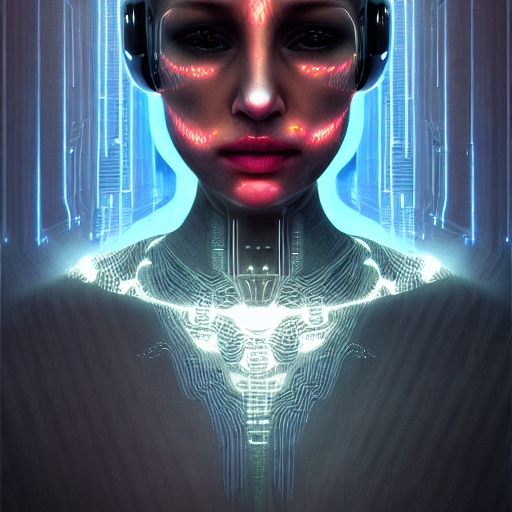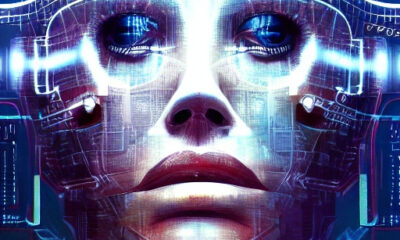
News
10 Ways Artificial Intelligence is Changing Our World

Artificial intelligence (AI) has become one of the most transformative technologies of our time. From self-driving cars to facial recognition, AI is changing the way we live, work, and interact with the world around us. Here are 10 ways that artificial intelligence is changing our world:

- Improving Healthcare
AI is being used to improve the accuracy of diagnoses, reduce medical errors, and increase the efficiency of healthcare systems. AI can analyze large amounts of data to identify patterns and predict outcomes, helping doctors make more informed decisions. AI is also being used to develop new drugs and treatments, with the potential to revolutionize the field of medicine.
- Enhancing Education
AI is being used to create personalized learning experiences, tailored to the needs of individual students. AI-powered chatbots and virtual assistants can provide students with instant feedback and support, helping to improve their learning outcomes. AI is also being used to develop educational content, such as interactive textbooks and educational games.

- Transforming Finance
AI is being used to improve financial decision-making, from predicting market trends to assessing credit risk. AI can analyze vast amounts of financial data to identify patterns and predict outcomes, helping financial institutions make more informed decisions. AI-powered chatbots and virtual assistants are also being used to improve customer service in the financial sector.
- Improving Transportation
AI is being used to develop self-driving cars and other autonomous vehicles, which have the potential to reduce accidents, improve traffic flow, and reduce carbon emissions. AI is also being used to optimize transportation networks, helping to reduce congestion and improve the efficiency of public transportation.
- Enhancing Customer Service
AI-powered chatbots and virtual assistants are being used to improve customer service across a range of industries, from retail to healthcare. These tools can provide instant support and personalized recommendations, helping to improve customer satisfaction and loyalty.
[the_ad id=”41670″]
READ ALSO: The Ethics of Artificial Intelligence: Balancing Innovation and Responsibilit
- Improving Manufacturing
AI is being used to optimize manufacturing processes, from predictive maintenance to quality control. AI can analyze vast amounts of data to identify patterns and predict equipment failures, helping manufacturers reduce downtime and improve productivity. AI is also being used to develop new materials and products, with the potential to revolutionize the manufacturing industry.
- Enhancing Cybersecurity
AI is being used to improve cybersecurity, from detecting and preventing cyberattacks to identifying vulnerabilities in computer systems. AI can analyze vast amounts of data to identify patterns and anomalies, helping to detect and respond to cyber threats in real time.
- Revolutionizing Agriculture
AI is being used to optimize agricultural processes, from precision farming to crop forecasting. AI can analyze vast amounts of data, from weather patterns to soil conditions, to help farmers make more informed decisions. AI-powered drones and other devices are also being used to monitor crops and livestock, helping to improve the efficiency and sustainability of agriculture.
- Enhancing Creative Industries
AI is being used to enhance creativity across a range of industries, from music to art. AI-powered tools can analyze vast amounts of data to identify patterns and generate new ideas, helping artists and creatives to explore new avenues of expression.
- Changing the Future of Work
AI is changing the way we work, from automating routine tasks to augmenting human decision-making. AI-powered tools can improve productivity, reduce errors, and help workers make more informed decisions. However, AI also has the potential to disrupt existing jobs and industries, leading to significant economic and social impacts.

In conclusion, artificial intelligence is changing our world in profound ways. From healthcare to education, finance to transportation, AI is transforming the way we live, work, and interact with the world around us. While there are challenges and risks associated with AI, the potential benefits are enormous. As AI continues to evolve, we
will likely see even more innovative applications and use cases emerge, further transforming our world in ways we cannot yet imagine. As we embrace the possibilities of AI, it will be important to consider the ethical and social implications of these technologies, and to work towards creating a future in which AI serves the common good.
One potential challenge associated with AI is the risk of bias and discrimination. AI algorithms are only as unbiased as the data they are trained on, and if this data is skewed or incomplete, the AI may produce biased or unfair outcomes. This can have significant implications for areas such as criminal justice, where AI is being used to assess the likelihood of recidivism and determine sentencing. It will be important to ensure that AI is used in a fair and transparent manner, and that its decisions are subject to scrutiny and oversight.
Another potential challenge associated with AI is the impact on employment. As AI continues to automate routine tasks and perform complex decision-making, it may lead to job displacement and economic disruption. However, there are also opportunities for new jobs and industries to emerge, such as those related to the development and maintenance of AI systems. It will be important for governments and businesses to work towards creating a just transition for workers, ensuring that they have access to the training and support they need to adapt to the changing nature of work.
Finally, there are ethical concerns associated with the use of AI in areas such as surveillance and warfare. AI-powered surveillance systems raise concerns about privacy and civil liberties, while the use of autonomous weapons raises concerns about accountability and the potential for unintended harm. It will be important to establish clear ethical and legal frameworks for the development and use of AI in these areas, and to ensure that these technologies are used in a manner consistent with human values and dignity.
In conclusion, artificial intelligence is a powerful technology with the potential to transform our world in profound ways. From improving healthcare and education to revolutionizing agriculture and manufacturing, AI is already changing the way we live, work, and interact with the world around us. However, as we continue to develop and deploy these technologies, it will be important to consider the ethical and social implications of AI, and to work towards creating a future in which AI serves the common good. By doing so, we can ensure that AI continues to drive innovation and progress, while also promoting human well-being and flourishing.




























